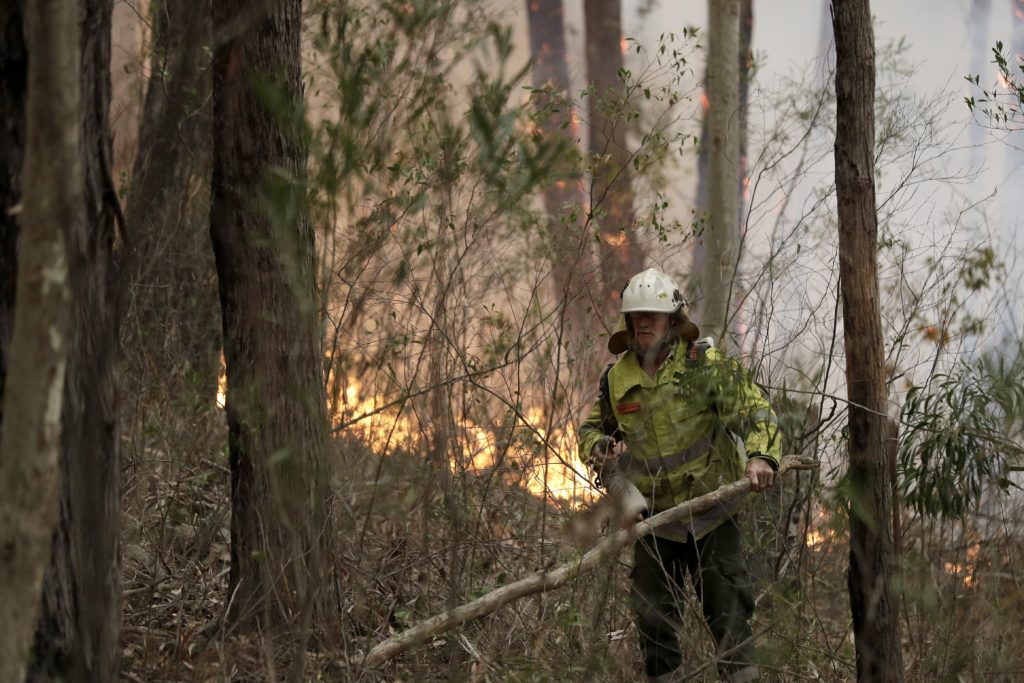
A firefighter keeps an eye on a controlled burn used to control a larger fire near Burrill Lake, Australia, Sunday, January 5, 2020. Milder temperatures Sunday brought hope of a respite from wildfires that have ravaged three Australian states, destroying almost 2,000 homes. |AP Photo/Rick Rycroft
SYDNEY — Australian Prime Minister Scott Morrison defended his leadership and his government’s record on climate change Sunday as milder temperatures brought hope of a respite from wildfires that have ravaged three states, claiming 24 lives and destroying almost 2,000 homes.
Morrison has faced widespread criticism for taking a family vacation in Hawaii at the start of the wildfire crisis, his sometimes distracted approach as it has escalated and his slowness in deploying resources.
He was heckled last week when he visited a township in New South Wales in which houses had been destroyed and which was home to one of three volunteer firefighters who have died in the crisis so far.
On Saturday Morrison announced that, for the first time in Australian history, 3,000 army, navy and air force reservists will be thrown into the battle against the fires. He also committed $14 million to leasing fire-fighting aircraft from overseas.
But those decisions attracted complaints that he had taken too long to act as fires have burned through millions of hectares (acres) in New South Wales, Victoria and South Australia, an area twice the size of Maryland.
Morrison told a news conference Sunday it was not the time for blame.
“There has been a lot of blame being thrown around,” Morrison said. “And now is the time to focus on the response that is being made. … Blame doesn’t help anybody at this time and over-analysis of these things is not a productive exercise.”
Morrison has been chided for past remarks that appear to minimize the link between climate change and Australia’s escalating threats of drought and wildfires.
“There is no dispute in this country about the issue of climate change globally and its effect on global weather patterns and that includes how it impacts in Australia,” he said.
“I have to correct the record here. I have seen a number of people suggest that somehow the government does not make this connection. The government has always made this connection and that has never been in dispute.”
Cooler temperatures and lighter winds on Sunday brought some relief to threatened communities, a day after thousands were forced to flee as flames reached the suburban fringes of Sydney.
Thousands of firefighters fought to contain the blazes but many continued to burn out of control, threatening to wipe out rural townships and causing almost incalculable damage to property and wildlife.
As dawn broke over a blackened landscape Sunday, a picture emerged of disaster of unprecedented scale. The Rural Fire Service said 150 fires were active in the state, 64 of them uncontrolled.
“It’s not something we have experienced before,” New South Wales Premier Gladys Berejiklian said.
The latest fatality occurred at Batlow in New South Wales, where a 47-year-old man died Saturday night while defending the home of a friend from encroaching fires. New South Wales police said the man was found unconscious in a vehicle and could not be revived.
Earlier Saturday, a father and son who were battling flames for two days died on a highway on Kangaroo Island, off South Australia state. Authorities identified them as Dick Lang, a 78-year-old acclaimed bush pilot and outback safari operator, and his 43-year-old son, Clayton. Their family said their losses left them “heartbroken and reeling from this double tragedy.”
Lang, known as “Desert Dick,” led tours for travelers throughout Australia and other countries.
The deadly wildfires, which have been raging since September, have already burned about 5 million hectares (12.35 million acres) of land. That’s more than any one year in the U.S. since Harry Truman was president.
The early and devastating start to Australia’s summer wildfires has also been catastrophic for the country’s wildlife, likely killing nearly 500 million birds, reptiles and mammals in New South Wales alone, Sydney University ecologist Chris Dickman told the Sydney Morning Herald. Frogs, bats and insects are excluded from his estimate, making the toll on animals much greater.
Morrison’s handling of the deployment of reservists also came in for criticism Sunday. Rural Fire Service Commissioner Shane Fitzsimmons, who is leading the fight in New South Wales, said he learned of the deployment through media reports.
“It is fair to say it was disappointing and some surprise to hear about these things through public announcements in the middle of what was one of our worst days this season with the second-highest number of concurrent emergency warning fires ever in the history of New South Wales,” he said.
Morrison was also forced to defend a video posted on social media Saturday, which promoted the deployment of reservists and the government’s response to the wildfires.
The non-partisan Australia Defence Association said the video breached rules around political advertising.
“Party-political advertising milking ADF (Australian Defence Force) support to civil agencies fighting bushfires is a clear breach of the non-partisanship convention applying to both the ADF and ministers/MPs,” the association said.
In a tweet, Morrison said “the video message simply communicates the government’s policy decisions and the actions the government is undertaking to the public.”